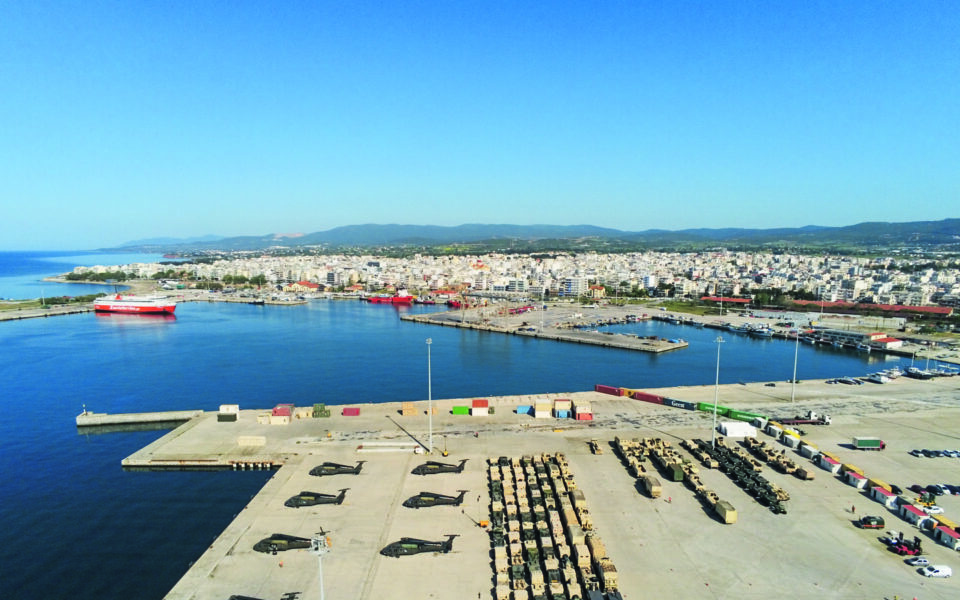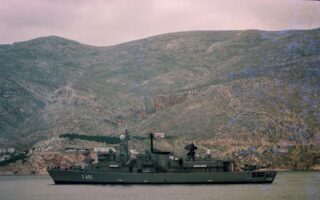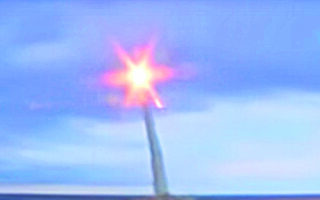Israel sees much value in ties with Greece
The US is supporting the country’s ongoing emergence as a vital energy hub, the head of JINSA tells Kathimerini

The deepening of the defense cooperation between Greece and the United States is developing at a steady pace, but even more can and must be done, the president and CEO of the Jewish Institute for National Security of America (JINSA), Michael Makovsky, said in an interview with Kathimerini.
In this context, he proposes more frequent contacts between the defense ministers of the two countries, and a rotation of American naval, air and ground forces through Greek bases as well as more joint training exercises with their Greek counterparts. He notes that such a development would send messages both to Russia that NATO’s eastern wing is strong, and to Turkey that “that it can’t keep destabilizing the increasingly important East Med.”
Makovsky, who visited Greece a few days ago and met, among others, the chief of the Hellenic National Defense General Staff (GEETHA), General Konstantinos Floros, speaks of a recognition of the rising strategic importance of Greece in Washington and describes Greece as a vital energy hub, making special mention of the investments that are taking place at the port of Alexandroupoli.
The president of JINSA, which has over 20,000 members and focuses on US cooperation with Israel, emphasizes that the Greek-Israeli strategic relationship is supported by all political parties in Israel.

What is your assessment of defense in the US-Greece cooperation?
The Biden administration is building upon its Trump predecessor’s important steps to boost bilateral defense and energy cooperation to all-time highs by: 1) renewing the MDCA last year, and expanding its duration and the number of Greek bases where the US forces can deploy and train/cooperate with Greek forces; and 2) boosting the US presence and investment in, and deployments through, Alexandroupoli port to strengthen NATO force posture in Eastern Europe and the Black Sea littoral in the wake of Russia’s invasion of Ukraine (note JINSA’s report on this important port here: jinsa.org/jinsa_report/strategic-potential-for-us-at-greek-port/). The US needs to do more of what’s already happening, namely rotating naval, air and ground forces through Greek bases and training with Greek counterparts. It sends a signal to Russia that NATO’s eastern flank is strong, and to Turkey that it can’t keep destabilizing the increasingly important East Med.
In the energy sector?
The US is supporting Greece’s ongoing emergence as a vital energy hub, including investment in Alexandroupoli port and surrounding pipelines, to help Southeastern Europe pivot away from dependence on Russian natural gas. The Biden administration’s explicit abandonment of support for the EastMed pipeline right before the Ukraine war was a very unfortunate unforced error, even if the pipeline never comes to fruition, since it signaled alack of broader US backing for East Med natural gas to the EU at precisely the wrong time (tellingly, five months later the EU signed a landmark deal to import Israeli natural gas via Egypt).
How do decision makers – from the administration, to the Congress and think tanks – view Greece’s role in the East Med?
‘The US needs to do more of what’s already happening, namely rotating naval, air and ground forces through Greek bases and training with Greek counterparts’
I believe there’s growing recognition of Greece’s rising strategic importance, especially given Greece’s democratic pro-Western government, especially in contrast to Turkey’s more complicated government, which is far too far friendly to Russia and Iran. Still, I would like to see more such recognition, and my organization, JINSA, has worked to promote closer US-Greek security ties.
What about more specifically in the Pentagon?
I think it’s important for Secretary of Defense Austin to visibly demonstrate support for Greek security and the importance of close US-Greek military ties by spending more time meeting with the Greek defense minister. I gather there has not been enough of those bilateral talks.
On the Greek side the strategic relationship with Israel transcends leaders, parties and ideologies (it deepened under Papandreou, Samaras, Tsipras and Mitsotakis). What is the situation on the Israeli side?
I believe the same is true on the Israeli side. Israeli leaders see much value in close ties with Greece, and I don’t see that changing at all, even if Israeli-Turkish relations become less tumultuous and more practical.
How deep is the level of security cooperation between Greece and Israel?
I believe it runs the gamut, and gather there is very close cooperation in security, intelligence, weapons procurement, training, exercises.
Are you worried about the internal divisions in Israel resulting from PM Netanyahu’s judicial overhaul?
It’s been a big surprise, and some of the rhetoric surrounding it has been terrible. It has certainly been damaging to Israel internally, and wrongly communicated Israeli weakness to Iran and related enemies. I also think the US government has significantly erred in interfering in this very domestic matter that is being addressed in a free and democratic country, and the Biden administration has allowed it to negatively impact US-Israel ties to the detriment of both nations and the benefit of Iran. My hope and expectation is that there will be some compromise, but that doesn’t seem imminent.
How differently will a Republican president approach the East Med, compared to Biden?
The Biden administration hasn’t been engaged enough, and that’s generally the case across the world, with America not leading, except perhaps on Ukraine, though that leadership at times has been too plodding and cautious. I hope the next Republican president will reassert US leadership, including taking up the focus on Greece and the Eastern Med that Secretary of State Pompeo showed at the end of his tenure.





